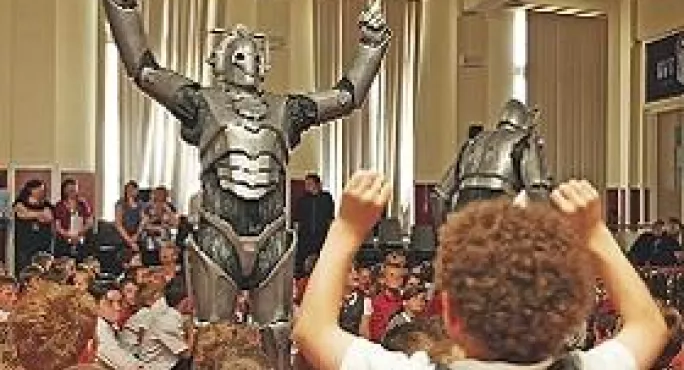Writing for the Time Lord: dreams do come true

Making a message memorable to children isn’t always easy. But it’s an advantage if you can snap your fingers and summon Doctor Who lead writer and executive producer Steven Moffat to your school.
It wasn’t quite that easy, says Gillian Penny, headteacher at Gavinburn Primary in West Dunbartonshire. “Steven is very busy. But it did help that he’s my brother.”
That also meant she was able to chat to the writer before the big event in the school hall - shared through Glow with 200 Scottish schools and 7,000 pupils - about what she wanted her pupils to take from it. That key message comes right at the end of the question-and-answer session with Mr Moffat and voice of the Daleks, Nicholas Briggs.
But before then, a surprise is sprung. The celebrity guests have just been introduced when a familiar sound is heard from outside the hall - the menacing, metronomic footfall of the Cybermen. From each of two doors a metal man enters and begins to walk among the seated children. One screams. Several laugh hysterically. Sound and adrenalin levels suddenly spike.
Young brains insist these are tall men in shiny suits. But young stomachs tell a different story. They’re very convincing monsters that scare you silly on Saturdays and will delete you in a heartbeat. No one in the hall is immune to the fear and excitement. “Wow! I’m glad it didn’t look at me,” says one adult, as the Cyberman strides purposefully past.
It’s a long five minutes. But everyone survives it, the monsters leave and the serious business begins - although there are plenty of laughs too in the one-hour session, as writer and voice actor take questions from the floor and the vast virtual audience beyond.
At one point, Mr Moffat reveals that the cracks in the skin of the universe, a recurrent theme in the present series, began with a real crack in his own son’s room. A sceptical young lad puts a tentative hand up and steps forward to say: “Uncle Steven, where is the crack in Louis’s bedroom?”
Questions of wider interest probe the writing process, the origin of ideas and how someone from Scotland can end up with such a fantastic job. “Did you write a lot of stories when you were a little boy?” wonders Gavinburn’s Eilidh (P3).
“All the time,” replies Mr Moffat. “I never wanted to be anything but a writer. I used to drive my sisters nuts. The stories would always be about monsters too, so nothing much has changed.”
Is writing hard, Emily wonders; “or once you get a feel for a storyline, does your imagination take over?”
“They’re all hard,” Mr Moffat confirms. “It’s like I keep forgetting how to do it. I get terribly stuck in every script I write. You get the characters into the most exciting situation you can imagine. Then you’ve no idea what to do next.”
At this point, Mrs Penny takes one of many questions the virtual audience has been firing in through Glow. “This is from Karen Whitelaw, Primary 4 at St Peter’s School in Aberdeen: `Were you any good at writing or did your teacher say you were rubbish?’”
“At school my teachers told me I was good at writing and I believed them. That’s really what gave me the idea that I could do it for a living.”
A couple of boys in the hall ask Mr Briggs about the voices he does, and he explains that he’s been doing Daleks and other Doctor Who monsters since he was five. “I was in my twenties before I discovered a device called a ring modulator. We use it for Daleks and Cybermen, but you can’t talk into it normally. You have to imagine you’re a nasty little blob in a metal casing - and-you-are-really-CROSS-with-EVERYONE!”
The audience looks startled because, ring modulator or not, it sounds suddenly like a Dalek is among them.
Then comes the question Mrs Penny herself has prepared, the answer to which reveals to the children that these men, and their myths and monsters, are not from a different world at all.
“Ever since I can remember, you wanted to write, and I guess you dreamed of writing for Doctor Who?” she says.
“You always think you’ll never be the person who gets that really cool job,” her brother replies. “You think it’s somebody else from somewhere more exciting. What are the chances of me watching a programme in Paisley when I’m seven and ending up in charge of it?”
He turns towards the young audience: “The truth is anyone can make that journey from anywhere. People say to you, `Be careful what you wish for’. Just ignore them. Wish for what you want.”
douglas.blane@tes.co.uk
- `Blood of the Cybermen’, the latest episode in the free BBC series Doctor Who, The Adventure Games, is now available for download: www.bbc.co.ukdoctorwhodwtheadventuregames.
Keep reading for just £1 per month
You've reached your limit of free articles this month. Subscribe for £1 per month for three months and get:
- Unlimited access to all Tes magazine content
- Exclusive subscriber-only stories
- Award-winning email newsletters


